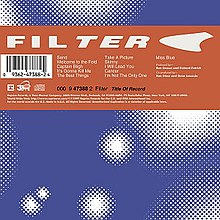Title of Record
| Title of Record | ||||
|---|---|---|---|---|
 |
||||
| Studio album by Filter | ||||
| Released | August 24, 1999 | |||
| Recorded | 1997-1999 | |||
| Studio | Abyssinian Sons Studio Chicago, Illinois, U.S. |
|||
| Genre | Industrial metal,industrial rock, alternative rock | |||
| Length | 70:23 | |||
| Label | Reprise | |||
| Producer | Ben Grosse, Richard Patrick, Rae DiLeo | |||
| Filter chronology | ||||
|
||||
| Singles from Title of Record | ||||
|
||||
| Professional ratings | |
|---|---|
| Review scores | |
| Source | Rating |
| Allmusic | |
| Alternative Press | |
| Entertainment Weekly | B |
| Q | |
| Robert Christgau | |
| Rolling Stone | |
| Rock Hard (de) | (9/10) |
Title of Record is the second album by American industrial rock band Filter. It was released on August 24, 1999, via Reprise Records. The album's earlier sessions were marred with slow progress due to line-up changes and frontman Richard Patrick deciding to create his own studio for recording. Upon solidifying the line-up, and bringing in further production help, progress improved, and the album was eventually released on August 24, 1999. The album would be a commercial success for the band, being their second of two platinum selling albums, selling over one million copies.
The album's creation took part over the course of an exhaustive four-year period. After the creation of Filter's 1995 debut album, Short Bus, which was created entirely by frontman Richard Patrick, Brian Liesegang, and a drum machine, the band toured in support of the album throughout 1996. In order to do this, a live band was recruited, consisting of Geno Lenardo on guitar, Frank Cavanaugh on bass, and Matt Walker on drums.
Reports of working on a second album started to arise in early 1997. Initial plans involved Patrick and Liesegang working together on a second album in a similar manner as their first album. Liesegang initially spoke of traveling across North America and recording on a PowerBook whenever inspiration hit them. He referred to a tentative title as Longbutter, a tentative release date of September 1997, and hinted of moving in a more electronic direction now that the band had established themselves as different from Nine Inch Nails, of which they had both been a part prior to Filter. Prior to formal recording sessions for a new album, the two wrote and released a few songs on movie soundtracks, most notably the electronic rock track "(Can't You) Trip Like I Do" with The Crystal Method, which proved to be a turning-point for the two. The sessions strengthened Liesegang's conviction to move into more of an electronic, Radiohead-type musical direction, whereas it had the opposite effect on Patrick, inspiring him to keep the music heavy and guitar oriented.
...
Wikipedia
